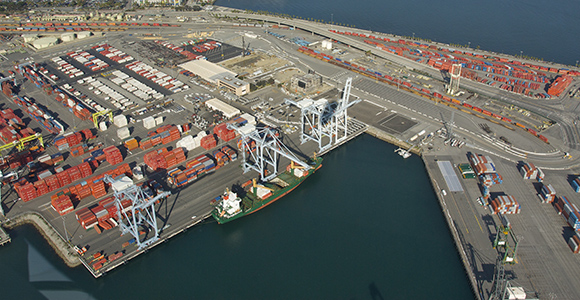
(Photo: Dave Proffer/Wikimedia)
California has the fifth largest economy in the world—and our role as a global trade leader is a big reason why. There are jobs, tens of thousands of jobs, which are connected to the sector. Leah Goold-Haws is the California Community Colleges Sector Navigator of Global Trade and Statewide Director of the California Centers for International Trade Development. As she says, the future of work is globally connected. Here’s a recent interview we did with her:
What makes the Global Trade a critical component of California's economy?
Global Trade is a critical component of California's economy not only due to the enormous amount of cross-border sales contributing millions of dollars to the state's economy but also as a mechanism for new job creation, especially within the technologies and digital space. As eCommerce has made evident, more California companies of every shape and size are able to reach global customers through online sales. Statistics confirm that those companies with a diverse portfolio that includes foreign customers are less impacted by domestic market downturns when prepared.
What are employers telling you that they need from the community colleges for workforce development?
Employers are looking for opportunities to collaborate with colleges in amplifying existing programs that have relation to their trade activities such as web design, digital marketing, social media, data analysis and ecommerce courses. Additionally, employers want students to be exposed to using these tools with an understanding of how they can be leveraged for foreign customer acquisition.
What successes are you having with employers already—and how are students benefiting?
The Deputy Sector Navigator team members all come from the international business space and have been immediately able to connect their regional colleges to several globalized industry partners. In addition, each DSN is working with the Centers of Excellence and other data centers to gain a robust understanding of their region’s employers engaged in global trade activities. The sector is working collectively on an internship model, currently being piloted in two regions, that allows students to work on digital projects, under the direction of an eCommerce expert, as part of a virtual internship program. The sector is also involved in several cross-sector projects including special projects involving agriculture, tourism and logistics – all of which are heavily impacted by a global footprint.
We know that early learning opportunities—internships and other real-world experiences—are a priority. How is that effort going?
One of the challenges for students is the opportunity to gain actual international experience within a large corporate structure that is often too complex and with too much potential for risk to engage interns. Far more frequently, small to mid-size business companies require real international support through their online platforms both internal and external such as Amazon or eBay. The DSNs are working with industry leaders such as Amazon in packaging case studies that allow students to work through real world examples of global small business needs. These case studies are being used in the classroom and with faculty that are training in the digital space as part of preparing students for internships including the virtual internship pilot referenced above.
Looking forward to the next year, what are the challenges and the opportunities in your sector?
Some of the biggest challenges are the many misconceptions as to the role of global trade in the economy and in employment opportunities. Additionally, as technologies make globalization increasingly more accessible to companies from every sector, job titles are rapidly changing and are not accurately reflected in the current data sources. By restructuring the single (1) TOP Code/SOC Code associated with International Business sector, such that a total of 6 TOP Codes are recognized as relevant to global trade skills, colleges and students can claim a greater number of courses that prepare students for the globally connected workforce. The good news is many colleges are already training students in the digital landscape, including ecommerce. This creates an opportunity to give empower students as they move into the workforce with highly coveted skills that enable global sales.
The California Community Colleges have identified ten economic sectors in the Strong Workforce Program, which has long been support by the California Economic Summit. The Summit—which has a network of thousands of Californians—has been working on the state’s workforce issue for seven years. This year’s annual meeting of the Summit will be held in Fresno November 7-8.

